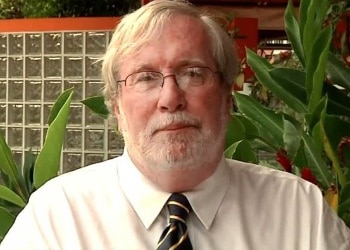A University of Miami professor and expert on organized crime in Latin America has been charged with laundering millions of dollars of illicit proceeds from Venezuela, causing both shock and consternation in his circle and beyond.
Bruce Bagley, a professor of international studies who has researched and written extensively on drug trafficking networks in the Americas, allegedly assisted at least two others to launder some $3 million from graft and corruption schemes in connection with Venezuelan public works projects, according to a November 18 indictment filed in a New York federal court.
Bagley is charged with two counts of money laundering and one count of conspiracy to commit money laundering. He did not return emails from InSight Crime seeking comment. His lawyer, Daniel Forman, said Bagley appeared in Miami federal court and was released on $300,000 bail. If convicted, Bagley could face up to 20 years in prison.
“Like you, all of us were shocked about the charges brought against Dr. Bagley,” Forman said in an email. “At this point we are evaluating the case and the prospective evidence and feel that at the end of the day Dr. Bagley will be vindicated.”
SEE ALSO: Coverage of Money Laundering
According to the indictment, Bagley received the money in accounts that he set up via 14 deposits from Swiss and United Arab Emirates bank accounts between November 2017 and April 2019, then transferred the cash into a co-conspirator’s accounts to hide the source of the funds while collecting a percentage for his services.
The indictment says Bagley opened one account in November 2016 at a Florida bank under the name of a company he had founded a decade earlier. Between November 2017 and February 2018, the indictment adds, the account received four deposits of $200,000 each from a purported food company in the United Arab Emirates. Bagley visited the bank with an individual not named in the indictment and withdrew the bulk of the $800,000 in cashier’s checks payable to that person; he then wired $80,000 to his personal account, prosecutors said.
Bagley received another $1.7 million in deposits between March and August 2018, prosecutors said. The indictment added that he then withdrew $1.1 million in cashier’s checks and wired $92,000 to his personal account. The money, according to the government, came from a Swiss account held by a wealth management firm in the United Arab Emirates.
Prosecutors said the Swiss and UAE accounts actually belonged to a Colombian. Bagley was informed that the funds were the proceeds of “foreign bribery and embezzlement” out of Venezuela, according to the indictment.
Bagley knew the source of the money and entered into “multiple sham contracts in order to conceal it,” prosecutors wrote.
Once Bagley’s business account was shut down because of suspicious activity in October 2018, he opened a new one, they added. After receiving two deposits –- one in early January and the other in February 2019 — totaling $474,000, Bagley transferred himself $64,000 as a “commission for his services,” prosecutors said.
Bagley enriched himself from funds “stolen from the citizens of Venezuela,” Geoffrey S. Berman, the US Attorney in Manhattan, said in a news release.
InSight Crime Analysis
Bruce Bagley’s indictment on money laundering charges is nothing less than stunning to the academics, journalists, government prosecutors, policymakers and investigators –including InSight Crime — who frequently consulted the longtime expert on organized crime. Bagley participated as a panelist at InSight Crime’s first conference on organized crime in Bogotá, Colombia, in 2018.
Although he was a critic of the war on drugs, there was little to indicate he was trying to exploit the system for his own gain. Indeed, Bagley knew the strengths and weakness of the system better than anyone.
In addition to his academic work, he acted as a consultant to the United Nations, Latin American countries, and US government agencies, including the Federal Bureau of Investigation (FBI) and the Drug Enforcement Administration (DEA), on issues of public security, drug trafficking and money laundering, according to an online biography.
Bagley wrote extensively on the ill effects of organized crime on Latin American countries.
Among his most influential works was a paper titled “Drug Trafficking and Organized Crime in the Americas: Major Trends in the Twenty-First Century,” published in 2013, and later reprinted in the book “Drug Trafficking, Organized Crime, and Violence in the Americas Today,” which he co-edited.
The paper provided several frameworks for describing organized crime that are still cited, including the so-called balloon effect, which describes how drug cultivation and trafficking routes move to new areas depending on the focus of security forces, the way a balloon swells when one spot is squeezed.
Bagley also described in the same paper the fracturing of Colombia’s powerful Medellin Cartel, as well as the Cali Cartel, into smaller criminal networks, allowing them to be more “deft and subtle,” to better hide their “political linkages,” and to expand into illegal activities beyond drug trafficking, such as land piracy and illegal gold mining. Mexico’s cartels, he wrote, appear to be following the Colombian pattern.
SEE ALSO: Colombia News and Profile
He was highly critical of the war on drugs, calling the US and international policy a failure and railing against the little or no international backing for other options, “no matter what collateral damage is incurred.”
The price that Colombia has paid, Bagley wrote, has been high in “both blood and treasure,” and the price Mexico is being asked to pay “is as high or higher.”
Bagley’s alleged connection to corruption schemes in Venezuela is especially ironic. Venezuela’s collapse has given rise to a litany of organized crime threats, including state-sponsored drug trafficking; violent, massive gangs; alleged extrajudicial killings by state security forces; and foreign armed groups finding safe haven in the country. Egregious and rampant corruption has helped plunge it into economic crisis, ultimately forcing waves of desperate Venezuelans to flee the country in search of work, and even food and medicine.

